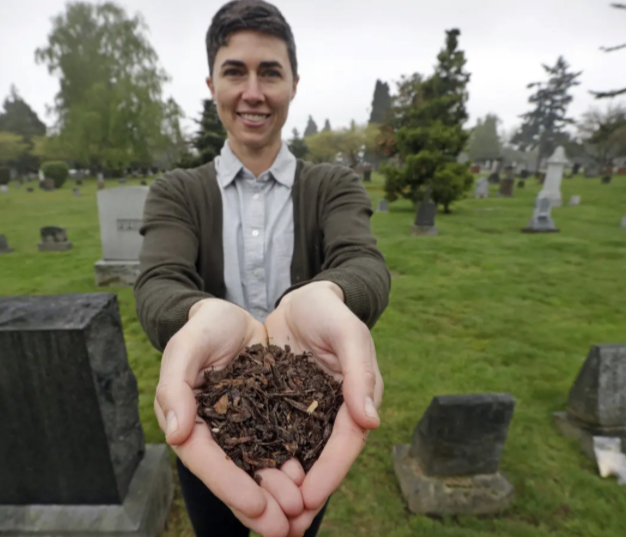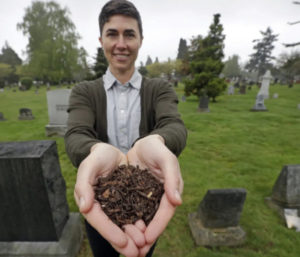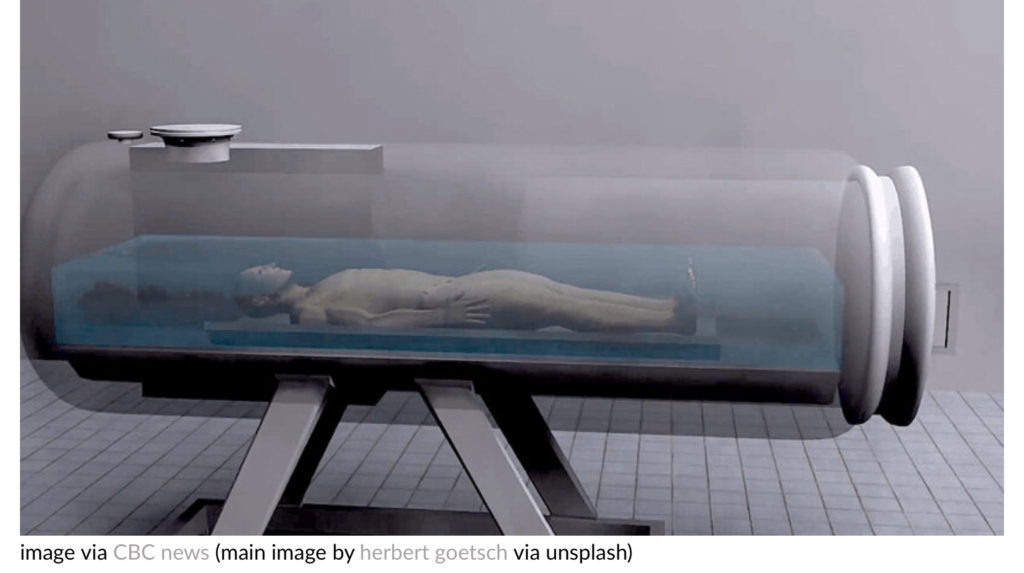
In a recent blog they announced that only 5 States in the USA have legally accepted human decomposting. In the UK it is legal already. So what is this? “The human composting process takes 30-60 days to complete and creates between one and one-and-one-half cubic meters of soil that can be used for returning to gardens, landscapes, or other scattering grounds as the family desires. This also allows for many family and friends to receive composted remains to create a memorial that is fit for the memories they have.”

If a cremation is about the equivalent of 30 gallons of petrol and a single cremation releases about 250kg of CO2 into the atmosphere, and a burial includes embalming fluid and a fair amount of concrete, then human decomposting is natural. Whereas cremation or burial could be deemed not carbon zero, human decomposting or terramation, involves a body being put in a metal container along with wood chips, straw and alfalfa (a plant in the legume family). After four to six weeks loved ones are left with a pot of soil to take home, which they can use to grow flowers or a tree. Carbon zero.
There’s a positive legacy in that family where your body can grow some flowers or a tree in their garden.
It strikes me that we should always take care of the Earth as we going to end up as earth…this reinforces this.
So ,other than burial, cremation and now composting, are there any other ways?
What about Aquamation?
This is what happened to Archbishop Desmond Tutu. This is also called “alkaline hydrolysis” or resomation, the body of the deceased is immersed for three to four hours in a mixture of water and a strong alkali, such as potassium hydroxide, in a pressurised metal cylinder and heated to around 150C. Wow, is this carbon zero? Not exactly.

Yes, Aquamation has no direct emissions of harmful greenhouse gases or mercury and requires no burning of fossil fuels. You get the remains of your loved one just like after cremation. “It’s good at breaking down chemotherapy drugs and [any other] drugs that were in the body, and if people want to be embalmed it breaks down embalming chemicals.”
What remains (sic) are bleached white bones, around 20% more in content than with traditional cremation. It is also more eco-friendly, using 90% less energy and 70% less carbon footprint than canton processes. The end result fluid didn’t contain harmful toxins unlike embalming fluid.
Cole Imperi, thanatologist and founder of the School of American Thanatology said an issue with considering Aquamation was “Body disposition is a choice that results from the intersection of a variety of influences on a person’s life–a person’s ancestry, geography, religion, worldview, community, wealth, recent family tradition, local availability and personal values (like environmental concern) can all significantly affect what disposition method someone chooses”. Hence we have politicians who incite negativity by claiming the process “dissolves bodies and washes the remains down the drain”.
In other words, many factors can affect our decision.

So what’s the problem in the UK?
There are no laws against water cremation or alkaline hydrolysis in the UK. However, the process needs very specific facilities which cost over £300,000 to install.
How do you feel about this?
We understand burial and cremation, to a degree, but what if we had the choice for ourselves or our loved ones to consider composting naturally or aquamation? Better to be mentally equipped then not to know possibly? Why not bring such questions to the next Death Café?
I found the dialogue interesting and I enjoyed it